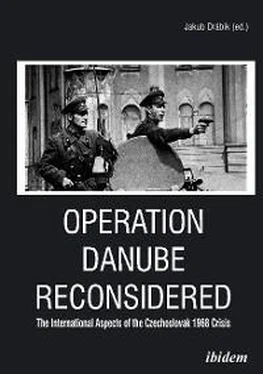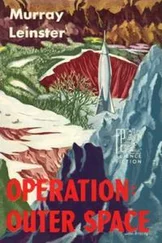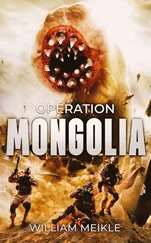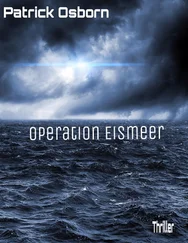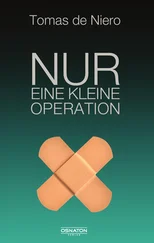According to various sources, Kremlin anxieties at the situation in Czechoslovakia—including worries about Czech ideological and cultural policy Soviet leaders deemed too liberal—was manifested a few years before the Prague Spring. In 1966, Leonid Brezhnev visited the 13th Congress of the Communist Party of Czechoslovakia and, returning to Moscow, shared his impressions with his comrades at the meeting of party activists. He expressed displeasure with too sharp criticism in the speeches of some speakers at Prague’s Congress. “Here in Moscow we need to protect ourselves from such things”, he noted. 4
Nevertheless, there was not too much anxiety, and if anybody who visited Czechoslovakia tried to sound such an alarm, it was not supported. One Komsomol functionary, who visited Czechoslovakia in 1964, wrote in his report that the Communist Party had completely lost its influence over Czechoslovak youth, who took their lead now from Western values. As the result he was accused of spreading slander and attempting to undermine the Czech-Soviet youth relations. The case was closed and he was not expelled from the Communist party only because his information about the weakening of party control over the youth in Czechoslovakia was confirmed from other influential sources 5.
Soviet leaders were well informed of the increasingly active demands by Slovak people for reform—and of the need for decentralization (felt and expressed by party members too), The sharp criticism of Antonín Novotný by Alexander Dubček in the fall of 1967 was no of secret in Moscow especially since Dubček on his own initiative had contacts with Soviet journalists and made them clear his position both on the Slovak question and the necessary reforms in the whole country 6. In December 1967, when Brezhnev himself went to Prague to see with his own eyes and to assess the state of affairs, the question of the relationship between the center and Slovakia seemed to him one of the priorities in terms of stability in the country 7.
It is known that on the eve of the final session of the plenum of the Czechoslovak Communist Party, where in early January 1968 Novotný’s successor was chosen, Dubček’s candidacy as the first secretary of the Communist Party did not raise opposition of the official Moscow 8. In childhood, he lived a long time in the USSR, he was a veteran of the Czechoslovak Communist Party, had long-standing and close ties with Soviet party functionaries and was not considered to be a politically unpredictable person. He was known as one of Antonín Novotný’s active opponents but Novotný was not perceived at that time to be a guarantee of stability and his support as the party leader has long ceased to be an axiom for Moscow. Brezhnev, during his conversations with high-ranking Czechoslovak Communists, qualified the question of re-electing the party’s first secretary as an internal Czechoslovak affair. 9
This made the subsequent disappointment in Dubček all the stronger. Moscow’s anxiety over the course of events in Czechoslovakia was manifested later, in March, under the influence of information received from the Soviet Embassy. The weakening of censorship and the resignation of many functionaries who were considered to be reliable partners of Moscow caused the greatest concern in the Kremlin, where they were afraid not only to lose control over Czechoslovakia but that the Czeh and Slovak reformers would set an example to those elsewhere in the USSR who were tempted by the prospect of liberalizing the Soviet system. It is well-known however that on March 23rd in Dresden (Eastern Germany), where the first meeting of the Soviet and East-European Communist Party leaders was held to assess the situation in Czechoslovakia, Brezhnev’s speeches were much more calm and moderate than Walter Ulbricht’s and Władysław Gomułka’s. This is confirmed by some lesser known sources, including the notes of the leader of the Ukrainian Soviet Communist Party organization in 1968 Petro Shelest, one of the main hawks in the Soviet leadership, who took part in Dresden talks as a member of the CPSU delegation. Shelest in his notes strongly criticized Brezhnev’s position (including that on the Dresden talks) as not too resolute and irreconcilable 10. If we would try to explain the roots of his position, it must be taken into account the KGB information from Eastern Slovakia concerning some attempts to revitalize the Greece-Catholic Church 11—that was the principal question for Western Ukraine where this Church was one of the foundation stones of Ukrainian anti-communist national movement. The Ukrainian Communist elite feared that impulses from Czechoslovakia, especially from Slovakia, will provoke national trends in Western Ukraine.
It is known that in early April the Action Program of the Communist Party of Czechoslovakia was adopted—the main conceptual document that brought the views of the Prague Communist reformers into system. The reaction in Moscow was quite negative. The document was qualified as the challenge to the indisputable right of the CPSU to form the guidelines of the Communist movement and the basic concepts of Socialism. It is precisely after the publication of the Action Program that Moscow’s view on the reform process in Czechoslovakia became tougher—the program of the Czechoslovakian reformers was criticized at the April Party plenum of the Central Committee CPSU 12, the campaign of criticism in the central Soviet press of the entire reform process in Czechoslovakia was launched at that time. According to some sources as early as in April the Soviet military headquarters intensified the working out of concrete plans for military action in Czechoslovakia in case the political leadership would prefer the force variant of actions to stop “revisionist” trends. It is known from the memoirs of general A. Maiorov who was in 1968 the commander of the Karpatian military district that as early as in middle-April the instructions were got how to act in the case of the preparation of the military operation 13. On April 8, 1968, the commander of the airborne troops, General V. Margelov, according to the directive received, began to elaborate the plan of using airborne forces in Czechoslovakia 14.
On April 28, 1968 the Yugoslavian leader Iosip Broz Tito came to Moscow after a long tour of the Asian countries and the next day had a long conversation with Brezhnev. The situation in Czechoslovakia became the main subject of discussion between leaders of the two countries 15. The Soviet side hoped for the proximity of the Soviet and Yugoslav viewpoints, bearing in mind that relations between the USSR and Yugoslavia had been improving since 1965—Yugoslavia supported the Soviet view on the middle-Eastern crisis of June 1967 (the six day war between Izrael and three Arabian countries) and in November Tito visited Moscow and took part in the celebrations of the 50th anniversary of the Bolsheviks’ revolution. Moscow attached importance to the Yugoslav view on the reform processes in Czechoslovakia, taking into account the international prestige of Tito as not only one of the founders and leaders of non-alignment movement, but as a person who at one time had the courage to challenge Stalin. Brezhnev did not hide from the Yugoslav leader his concern about the weakening of the CPCz leadership’s control over the political processes in the country, and at that time, for 4 months before the intervention, frankly expressed his opinion. In many respects, that opinion corresponded to the so-called Brezhnev doctrine (the doctrine of limited sovereignty), formulated later in the Declaration of Communist Parties in Bratislava in early August 1968 and—especially—in a number of the Soviet program declarations, ‘Pravda’ articles and the speeches by Soviet leaders after August 21. On April 29, 1968, during the talks with Tito, Brezhnev noted:
Читать дальше
